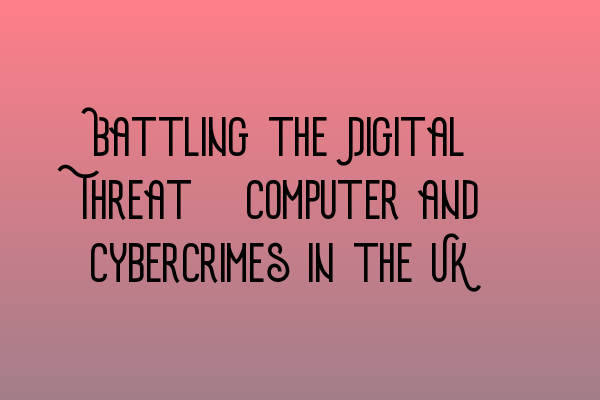Battling the Digital Threat: Computer and Cybercrimes in the UK
With the increasing reliance on technology, computer and cybercrimes have become a major concern in the United Kingdom. The pervasive presence of the internet and the wide range of digital devices offer vast opportunities for criminals to exploit unsuspecting individuals and organizations. It is imperative to understand the nature of computer and cybercrimes, their impact, and the measures taken to combat these digital threats.
What are Computer and Cybercrimes?
Computer and cybercrimes refer to criminal activities that are committed using digital platforms or targeting digital systems. These crimes can involve unauthorized access to computer systems, theft of sensitive information, financial fraud, online harassment, identity theft, and many other malicious activities.
The Impact of Computer and Cybercrimes
The impact of computer and cybercrimes can be far-reaching. Individuals and businesses can suffer financial losses, reputational damage, and emotional distress. Intellectual property theft can lead to the loss of valuable ideas and innovations. Governments and critical infrastructure are also vulnerable to cyber-attacks, which can disrupt essential services and compromise national security.
Measures Taken to Combat Computer and Cybercrimes
In response to the growing threat of computer and cybercrimes, the UK government, in collaboration with law enforcement agencies and cybersecurity experts, has implemented several measures to combat these offenses effectively:
- Legislation and Regulations: The government has enacted laws and regulations specifically targeting computer and cybercrimes, such as the Computer Misuse Act 1990 and the Data Protection Act 2018. These laws provide a legal framework for prosecuting offenders and safeguarding digital systems.
- Law Enforcement Efforts: Specialized cybercrime units, such as the National Cyber Crime Unit (NCCU) and the Cyber Crime Unit (CCU), are dedicated to investigating and prosecuting computer and cybercriminals. These units work closely with international law enforcement agencies to tackle cross-border cybercrimes.
- Public Awareness and Education: Promoting awareness about computer and cybercrimes is essential to empower individuals and organizations to protect themselves. Educational campaigns, workshops, and online resources aim to educate the public about safe online practices, identifying potential threats, and reporting cybercrimes.
- Cybersecurity Measures: Individuals and organizations are encouraged to implement robust cybersecurity measures, such as using strong passwords, regularly updating software, encrypting sensitive data, and employing firewalls and antivirus software. These measures can help prevent unauthorized access and mitigate the risk of cyber-attacks.
- International Cooperation: Computer and cybercrimes often transcend national boundaries. Cooperation among international law enforcement agencies and governments is crucial in tackling the global nature of these crimes. Sharing best practices, intelligence, and expertise helps to enhance the collective ability to combat computer and cybercrimes effectively.
Conclusion
Computer and cybercrimes pose significant challenges in the digital age. However, through legislation, law enforcement efforts, public awareness, cybersecurity measures, and international cooperation, the UK is committed to battling these digital threats. It is vital for individuals and organizations to stay informed, take necessary precautions, and report any suspicious activities to contribute to a safer digital environment.
For further resources and information related to SQE criminal law and practice in the UK, please visit the following links:
